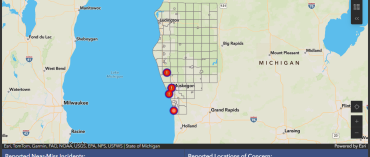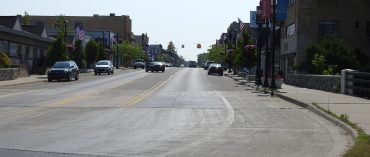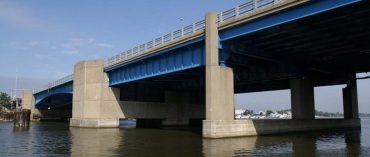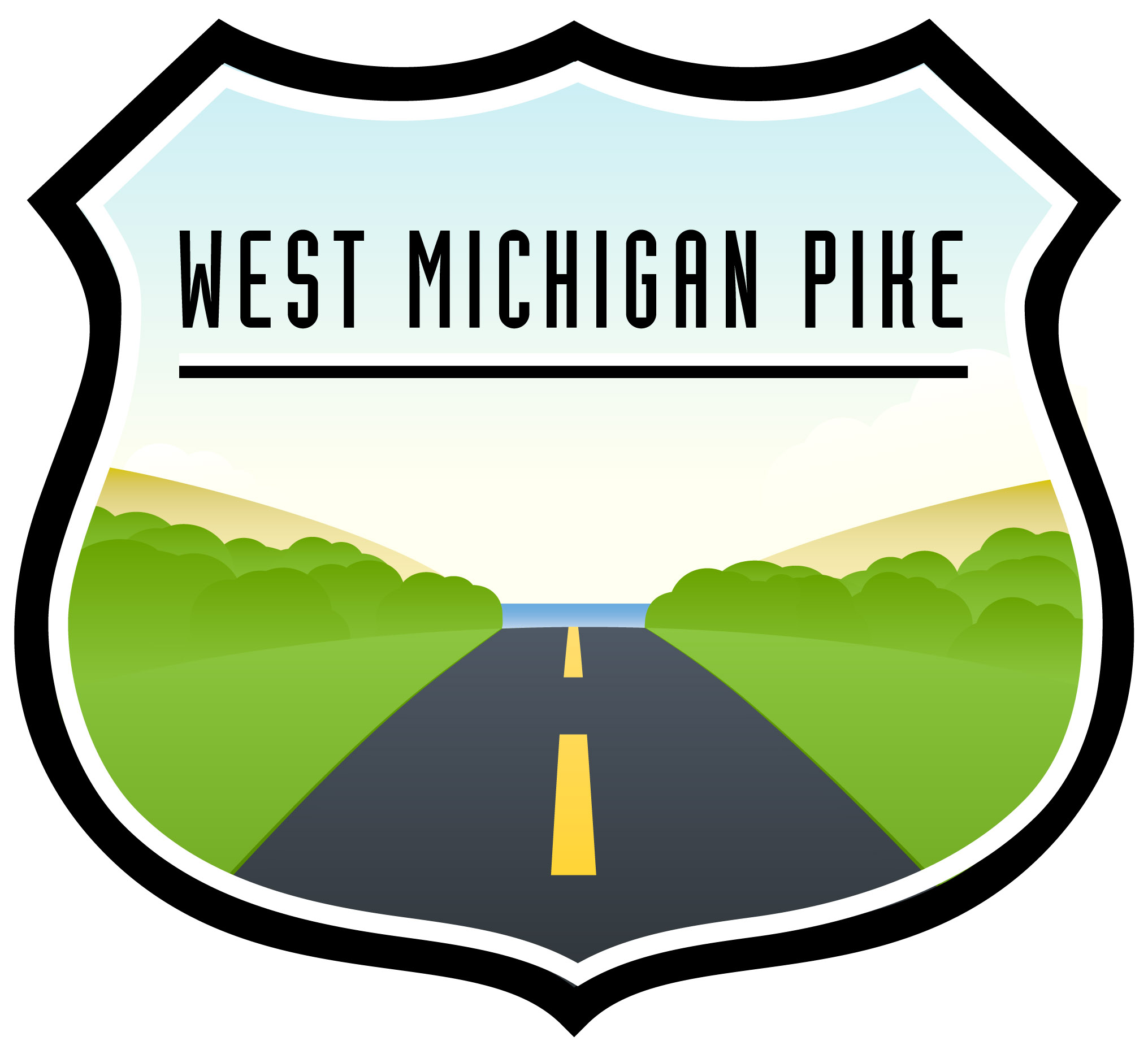MPO Policy and Technical meeting Agenda and Minutes
MPO Transportation Planning
The West Michigan Metropolitan Planning Program (WestPlan) is the Metropolitan Planning Organization (MPO) for Muskegon and Northern Ottawa County. The Moving Ahead for Progress in the 21st Century Act, (MAP-21), requires that an MPO be designated for each urbanized area with a population of more than 50,000 people in order to carry out the metropolitan transportation planning process, as a condition of Federal aid. The boundary of the MPO is defined by the US Census under 23 U.S.C. 101‑‑Section 101(A) of Title 23 of the U.S. Code of Federal Regulations. The Code includes a provision that allows the states, in cooperation with local officials, to adjust and develop an Urban Area boundary that encircles the Urbanized Areas in a region. An Urbanized Area comprises one or more central places/cities, plus the adjacent densely-settled surrounding territories (urban fringe), that together have a minimum of 50,000 persons. The urban fringe consists of a contiguous territory having a population of at least 1,000 persons per square mile. That boundary is established every ten years as a result of the decennial census. Urban Area Boundaries determine where transportation and mass transit funding may be spent.
WestPlan consists of a Policy Committee and a Technical Committee. The Technical Committee reports directly to the Policy Committee. The Policy Committee is responsible for all final decisions regarding transportation. All meetings, with the exception of special meetings, are held during normal business hours. The following local communities and/or transportation agencies and providers are members of WestPlan:
– Federal Highway Administration
– City of Ferrysburg
– City of Grand Haven
– Harbor Transit
– Michigan Department of Transportation
– City of Muskegon
– Muskegon Area Transit System
– Muskegon County Road Commission
– City of Muskegon Heights
– City of North Muskegon
– City of Norton Shores
– Ottawa County Road Commission
– City of Roosevelt Park
– City of Whitehall
– Village of Spring Lake
– City of Montague
– Village of Fruitport
– Muskegon County urban township rep
– Ottawa County urban township rep
– Muskegon County rural township rep
– Ottawa County rural township rep
– Muskegon County
– Ottawa County
The following is the WestPlan Transportation Policy Committee:
Transportation Policy Committee
- Kim Arter, Policy Committee Chairperson, Supervisor, Laketon Township
- Roger Belknap,Commissioner, Ottawa County
- Richard Carlson, Mayor, City of Ferrysburg
- Arnie Erb, Supervisor, Whitehall Township
- Jeff Franklin, Supervisor, Michigan Department of Transportation
- Diane Goodman, Councilperson, City of Roosevelt Park
- Rachel Gorman, Councilperson, City of Muskegon
- Michelle Hazekamp, Commissioner, Muskegon County
- Marcia Hovey-Wright, Commissioner, Muskegon County
- Bob Hires, Mayor Pro-Tem, City of Montague
- Ryan Kelly, Councilperson, Crockery Township
- Jack Kennedy, Commissioner, Muskegon County Road Commission
- Bonnie McGlothin, Mayor, City of Muskegon Heights
- Kevin McLaughlin, Council Member, Harbor Transit
- Bob Monetza, Mayor, City of Grand Haven
- Bill Mogren, Councilmember, City of North Muskegon
- Roger Morgenstern, Councilperson, City of Norton Shores
- Mark Powers, Councilperson, Village of Spring Lake
- Steven Salter, Mayor, City of Whitehall
- Kathleen Russell, FTA Representative, Federal Highway Administration
- Andrew Sibold, Planner, Federal Highway Administration
- Roger Vanderstelt, President of the Village of Fruitport
Transportation Technical Committee
- Brian Armstrong, Director, City of Whitehall DPW
- Scott Beishuizen, Superintendent, City of Montague DPW
- Craig Bessiner, Manager, City of Ferrysburg
- Steve Biesiada, Director, Fruitport Charter Township DPW
- Jill Bonthuis, Executive Director, Pioneer Resources
- Scott Borg, Transportation Director, Harbor Transit
- Paul Bowman, County Highway Engineer, Muskegon County Road Commission
- Wally Delamater, Director, City of Spring Lake, DPW
- Mark Disselkoen, Supervisor, City of North Muskegon DPW
- Marc Frederickson, TSC Manager, MDOT – Muskegon Transit Service Center
- Derek Gajdos, Director, City of Grand Haven, DPW
- Khi Guy, Director, City of Muskegon Heights DPW
- Amy Haack, Clerk, Village of Fruitport
- Dennis Kent, Region Transportation Planner, MDOT Grand Region
- Tyler Kent, Transportation Planner, MDOT Grand Region
- James Koens, Manager, Muskegon Area Transit System
- Brett Laughlin, Manager Director, Ottawa County Road Commission
- Jeff Marcinkowski, Supervisor, Fruitland Township
- Jim Murphy, Project Engineer, City of Norton Shores
- Todd Myers, City Engineer, City of Norton Shores DPW
- Jerry Rabideau, Supervisor, Spring Lake Township
- Kathleen Russell, FTA Representative, Federal Highway Administration
- Paul Sachs, Director, Ottawa County Plan & Performance Improvement
- Andrew Sibold, Planer, FHA – Michigan Division
- Wade VandenBosch, Director, Muskegon County DPW
- Dan VaderHeide, Director, City of Muskegon DPW
- Ben VanHoeven, Director, City of Roosevelt Park, DPW
- Luke Walters, MPO Program Manager, MDOT – Statewide Planning Section
The Technical Committee is comprised mostly of staff members of various member agencies. Members are typically engineers, city managers, or department of public works staff. The Technical Committee acts as an advisory committee to work on issues which are primarily technical. The Technical Committee then makes recommendations to the Policy Committee. The Policy Committee is comprised almost entirely of local elected officials who have been appointed to the committee by their jurisdictions. The Policy Committee is responsible for all final decisions regarding transportation within the MPO.
The MPO program addresses a multitude of transportation projects such as safety projects like widening lanes, bridge repairs and improvements, air quality projects like traffic signal synchronization, and enhancement projects like bike paths. Two important planning documents that are produced through this process are the Long Range Transportation Plan and the Transportation Improvement Program.
The MPO program also assists in transit planning for the Muskegon Area Transit System and Harbor Transit in northern Ottawa County. Planning activities include collaborating on services related to seniors and individuals with disabilities, etc.
Activities undertaken by WMSRDC include long-range transportation planning, data collection, highway planning, street inventory, and coordination of state and local transportation planning.
WMSRDC maintains a list of the annual average daily traffic on roads in the MPO area as well as rural areas. Traffic counts are an important aspect of metropolitan transportation planning.
Rural Transportation Task Force Planning
In 2012, WMSRDC established the West Michigan Rural Transportation Planning Program at the request of the Michigan Department of Transportation (MDOT). WMSRDC now administers the nearly $1.5 million in rural federal transportation funding allocated to the region. Through this program, WMSRDC works with the local road agencies to administer individual county task forces, as well as the regional task force, to plan for the most efficient and cost effective use of these funds. The current rural task force has been realigned to include all five counties within the region which are Lake, Mason, Muskegon, Newaygo, and Oceana.
Activities in the Rural Program include: schedule, plan, and attend Rural Transportation Task Force project selection meetings; ensure a cooperative planning process is being followed, the correct system is identified, and eligible work is submitted; ensure the required public involvement and consultation process is completed by providing citizens, affected public agencies, tribal governments, private transportation providers, and other interested parties with notice and opportunity to comment on proposed transportation projects, plans and programs transportation providers; and submit all season road changes to MDOT.
Regional Transportation Planning
The Regional Transportation Program addresses a number of transportation issues in the rural areas of the five-county region. Planning undertaken in the Regional Transportation Program include Technical Assistance to MDOT, public involvement, and local technical assistance planning. These items include activities such as regional transportation workshops, assistance in updating the Statewide Transportation Improvement Plan (STIP), and assisting MDOT in public involvement with officials and citizens in the rural areas of the Region.
Additional Regional Transportation Planning Program elements include Highway Performance Management System (HPMS) and Non-Motorized Planning. The HPMS provides data that reflects the extent, condition, performance, use, and operating characteristics of the nation’s highways. The Non-Motorized planning item examines aspects of non-motorized investment planning to identify needed projects and promote the consideration of bicycle and pedestrian options in the overall transportation planning activities
The objective of this program is to provide a comprehensive, regional multi‑modal transportation systems planning program in order to promote the most efficient and economical movement of people, goods, and services in cooperation with the Michigan Department of Transportation (MDOT), applicable county road commissions, local units of government, and various public and private transportation providers.
Asset Management Program
WMSRDC also participates, in partnership with the Michigan Department of Transportation (MDOT) and local road agencies, in the Transportation Asset Management Program. The program involves the development of an annual data base of road conditions of federal aid eligible roads in Michigan. Asset Management is a concept in the transportation industry that is emerging as an important planning tool for public officials, planners, engineers, and others that see data collection as a useful tool.
Each year, WMSRDC staff, along with MDOT and a county road commission employee, collects data for approximately half of all the federal aid roads within the Region. The data collection effort requires the collection of three items: PASER rating, surface type, and the number of lanes. PASER is a visual rating assessment system that rates the road surface condition for a given segment on a scale of 1-10. These ratings are the first step in the planning process known as Asset Management. Asset Management is based on an inventory of each local road network within each of the municipalities and then applying the correct fix or maintenance based on the rating.
Once rating is completed, WMSRDC converts the data into a format that can be used with a Geographic Information System so the communities can analyze their data and track year-to-year progress in upgrading their road systems.










